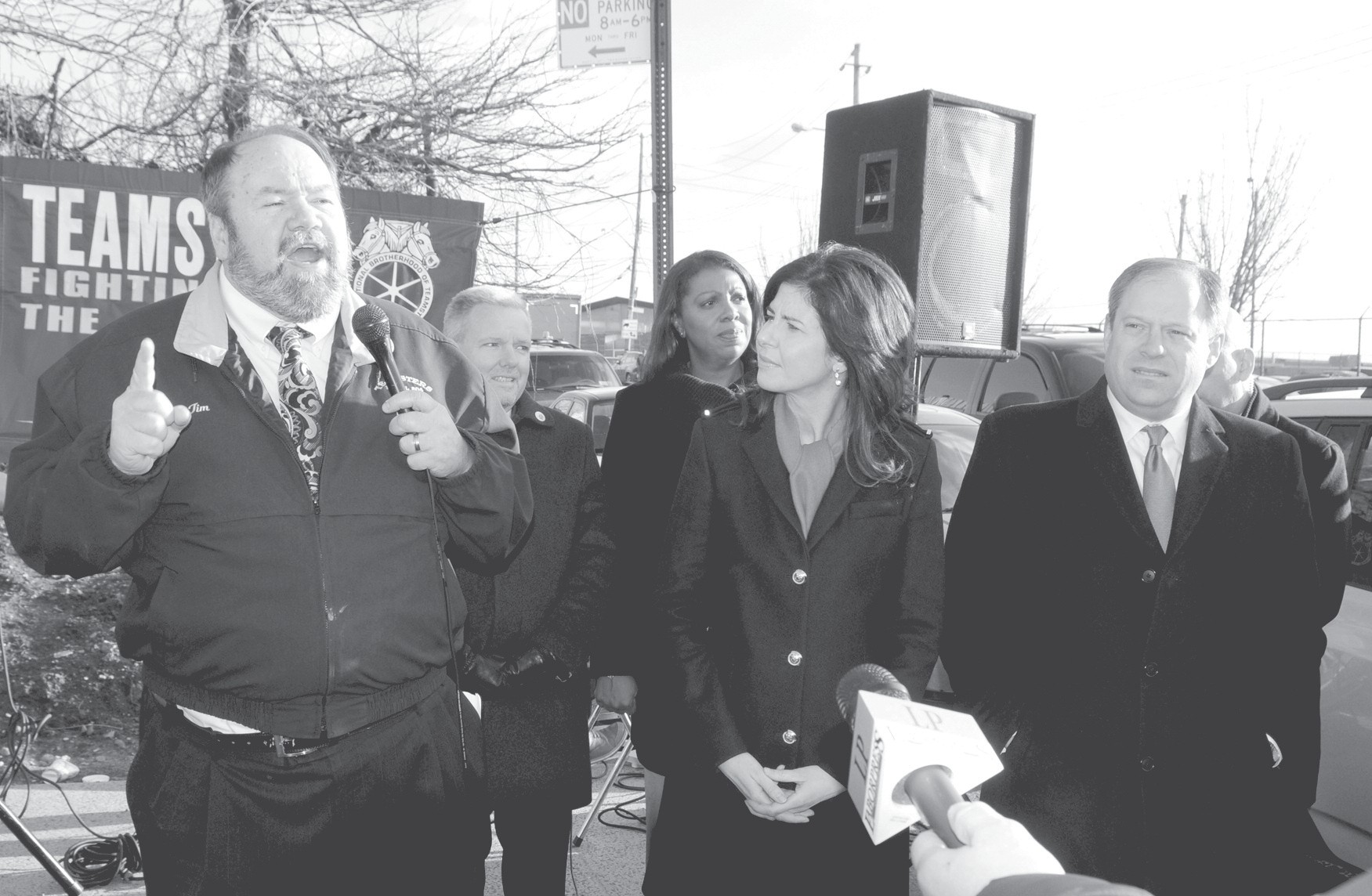Coalition Outlines Plan At Midville Meeting
Be prepared for a long-and expensive-fight with the city over the proposed Glendale homeless shelter, members of the Glendale Middle Village Coalition warned hundreds of attendees during the group’s inaugural meeting last Wednesday, Oct. 1.

With about 300 residents in attendance at the Christ the King Regional High School cafeteria, civic leaders and attorneys partially unveiled their legal strategy to block the planned transitional housing shelter for up to 125 families at 78-16 Cooper Ave., a former factory in Glendale bordering Middle Village.
Coalition attorney Chris Murray stated he would soon file in State Supreme Court an Article 78 declaration asking a judge to nullify the environmental assessment statement that an independent firm, AECOM, performed for the site on the Department of Homeless Services’ (DHS) behalf.
As previously reported, the statement declared that the former factory site-dormant for many years after housing various industries for decades-was safe for development. The DHS subsequently filed a “negative declaration” indicating that, because no major contamination was found, no remediation actions were necessary.

“The negative declaration means that’s the end of the review,” Murray said. “They don’t have to go through this lengthy process of reviewing the project. They can just enter into a contract and go forward.”
Opponents of the shelter dismissed that conclusion, arguing that AECOM performed a basic assessment that failed to take into account the site’s close proximity to other industrial (and likely contaminated) properties, such as the neighboring Independent Chemical Corporation.
Murray stated further red flags about the independent analysis were raised when the coalition learned the DHS signed off on the negative declaration on June 12-the same day it received the environmental assessment report from AECOM.
“If you read the report, you can see it does not give the government the necessary information to make an intelligent decision,” he said. “It’s not like the government went through the report, read it, analyzed it and made the determination-because they did it all in one day.”
“This was just a rubber stamp,” Murray added. “They were just going through the motions and not taking the proper analysis” on potential impacts on issues such as traffic congestion and school populations.
“Without doing that [full analysis], they’re not permitted to issue a negative declaration; they’re required to provide a full environmental impact statement (EIS),” he noted.
Should a judge nullify the assessment report, Murray noted, the DHS would then be required to perform a full EIS-which could take up to three years and millions of dollars to complete.
In addition to launching an extensive investigation into the site’s safety, he added, the EIS process is a public one, in which the public is asked to provide comments in writing and at hearings.
“It would take significant time and money” on the city’s part to go through with the EIS, he stated. “It’s an expensive and long process. … If you make it a long and expensive process, they may go elsewhere.”
Fred Haller of Glendale, also part of the coalition’s legal team, told the Times Newsweekly other legal strategies to stop the shelter are being pursued and would be filed concurrently in order to give the organization the best possible chance at succeeding.
“We have other legal theories that we’re working on,” he said to residents, noting that the coalition has not ruled out pursuing action with various state and federal agencies.
Coalition leaders- representing five civic and business associations in the two neighborhoods-repeated many reasons they’re opposed to the shelter, as previously stated at public meetings and in newspaper articles on the matter.
The leadership includes Sal Crifasi, president of the Middle Village Chamber of Commerce and the Middle Village Property Owners/Residents Association; Brian Dooley, president of the Glendale Property Owners Association; Robert Holden, president of the Juniper Park Civic Association; Kathy Masi, president of the Glendale Civic Association; and legal advisors Haller and Paul Kerzner.
In addition to questioning the site’s safety, coalition members denounced the city’s policy of “warehousing” hundreds of homeless people in one building rather than constructing smaller shelters that blend into communities.
Getting everyone involved
They also stressed that the group’s success rests on community participation and contribution to the effort, both in time and money-and took the initiative to secure both during last Wednesday’s session.
“We’re pretty lucky to have such dedicated workers and civic leaders,” Crifasi said, “but it’s not enough. We need everybody’s help.”
Attendees were asked to sign form letters for inclusion with the coalition’s Article 78 filing. One hundred copies of the letter were prepared for the meeting, and by the time the meeting ended, every one of them had been signed, according to coalition volunteer Diana Shanley.
The coalition also enlisted block captains to receive-and subsequently pass along to neighbors on their streets- updates and information regarding its efforts. Volunteer Bill Maher told the Times Newsweekly that more than 80 attendees signed up as captains.
Residents were also supplied a list of phone numbers for city agencies and elected officials they were encouraged to contact. The list also included the numbers of five board members for Samaritan Village, the nonprofit group that the DHS contracted to operate the Glendale shelter-which Masi claimed has repeatedly ignored community appeals and comments.
“We’ve been calling Samaritan Village board members for eight months,” she said. “It only takes 10 minutes to make five phone calls. If you all do that, by the end of the week, their phones will be blocked.”
Donations toward the legal effort-estimated to cost at least $100,000-were also accepted during the session. Many attendees provided coalition volunteers with cash or check contributions in small amounts ranging from $20 to $100.
Prior to last Wednesday’s meeting, the coalition raised more than $30,000, according to Masi. The contributions enabled the coalition to hire Murray and pursue the Article 78 filing, but further legal action is dependent upon additional contributions from residents and businesses.
Crunching the numbers further, Dooley declared that the coalition would meet its $100,000 goal if each of the estimated 5,000 families living in close proximity to the shelter site contributed $20.
“No amount is too small; no amount is too big, obviously,” he said. “We’re going to continue this fight and we will succeed.”
Holden also invited members of the public to contribute, and have a little fun doing so, during a coalition fund-raiser scheduled for 7 p.m. on Friday, Oct. 24, at Yerman’s Pub in Glendale. The program includes food, entertainment, raffles and prize giveaways.
“Our neighborhood is at stake. The battle lines are drawn,” he added. He encouraged residents to stay involved in the effort and attend the coalition’s next meeting, which will be scheduled at a later date.
Those interested in donating can mail checks or money orders payable to the Glendale Middle Village Coalition, c/o Crifasi Real Estate, 79-47 Metropolitan Ave., Middle Village, NY 11379. Contributions can also be made online at www.gofundme.com/Cooper- Avenue-Shelter. To volunteer, send an email to glendalemvcoalition@gmail.com.

































